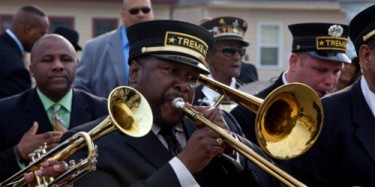 Back to selection
Back to selection
WHAT DO YOU THINK OF “TREME”?
 Most of the TV reviewers who reviewed David Simon’s new HBO series Treme were shown the first three episodes. I only caught the first, last night, on its premiere. Directed by Agnieskza Holland, the post-Katrina series set in the world of New Orleans musicians was undeniably gorgeous to look at and listen to. It took the fairly bold approach of not kickstarting with any huge central incident but rather sketching a tableaux of characters defined, in part, by their attitude toward a city that has been irrevocably changed. If The Wire was about characters defined by either their resistance or capitulation to the institutions that contained them, Treme seems to be about people rebuilding both themselves alongside their rituals, communities and social structures. Making a particular impression were The Wire‘s Wendell Pierce as a perpetually broke trombonist and Frozen River‘s Melissa Leo as a civil rights attorney. I’ll admit that at 82 minutes it felt a bit long to me, and that I was waiting for bigger narrative moments to emerge. But as a shamefully late-arriving fan of Simon’s The Wire, I am there for it this season. Next week’s episode is directed by Jim McKay (Our Song, Everyday People).
Most of the TV reviewers who reviewed David Simon’s new HBO series Treme were shown the first three episodes. I only caught the first, last night, on its premiere. Directed by Agnieskza Holland, the post-Katrina series set in the world of New Orleans musicians was undeniably gorgeous to look at and listen to. It took the fairly bold approach of not kickstarting with any huge central incident but rather sketching a tableaux of characters defined, in part, by their attitude toward a city that has been irrevocably changed. If The Wire was about characters defined by either their resistance or capitulation to the institutions that contained them, Treme seems to be about people rebuilding both themselves alongside their rituals, communities and social structures. Making a particular impression were The Wire‘s Wendell Pierce as a perpetually broke trombonist and Frozen River‘s Melissa Leo as a civil rights attorney. I’ll admit that at 82 minutes it felt a bit long to me, and that I was waiting for bigger narrative moments to emerge. But as a shamefully late-arriving fan of Simon’s The Wire, I am there for it this season. Next week’s episode is directed by Jim McKay (Our Song, Everyday People).
Herc at AICN has a great round-up of the early reviews here.
Also, in thinking about the show I found this “morning after” roundtable over at The American Prospect really helpful. (For one, it’s great to see a new series get immediate consideration not just from film and TV critics but political sites as well.) From that piece:
Alexandra Gutierrez: But yeah, given that even today, so many of New Orleans’ problems are tied to institutional breakdown, I’m curious to see where Simon will go. And I’m actually a little excited that the show isn’t exactly The Wire: Port of Call, New Orleans.
Joel Anderson: “So many of New Orleans’ problems are tied to institutional breakdown.” Word.
I don’t think there’s any way to gloss over this, particularly in post-Katrina New Orleans. I just figured Simon and Co. focused tightly on the individuals early on, so that there could be a macro focus on the city in the episodes to come.
And while Simon knew Baltimore backward and forward, I wonder how he and the other writers will navigate the show despite a general lack of institutional knowledge about the city.
But again so much about the pilot was — and should — have been about the individuals. The woman trying to rebuild her restaurant, the musicians trying to restart their careers, the families simply trying to reunite. There’s a lot of stuff in there.
We talk a lot about how the people of New Orleans are what make the city special. So rarely do we actually get the opportunity to know these people, and Treme — in a way — will give us a chance.
The Atlantic has devoted a whole string of articles to the series. Here’s from Rachael Brown’s take on its music:
The presence of “real” musicians among the characters provides a sense of authenticity that Simon clearly values, and also underscores the tension that plays around the show’s edges. Musicians in Treme are a useful stand-in for the social structure of the city as a whole. We see those who’ve made it by leaving, only to return post-storm, those who chose to stay, and many who aren’t making it at all. Seemingly two local musicians can support themselves: Delmond Lambreaux (played by Rob Brown), and Kermit Ruffins. Delmond has found success looking beyond the city’s musical heritage, playing straight-ahead jazz at the Blue Note in New York, while Kermit is embracing that heritage completely, almost becoming a caricature of it. After a gig, Davis urges a reluctant Kermit to go talk to Costello, who had been in the club’s audience. “Make a friend, make a contact,” he scolds. “Don’t you want to get famous?”
However, Simon doesn’t let the viewer forget that for some, it’s not just about the music. “Play for that motherfucking money boys!” Antoine continuously reminds his bandmates. The Treme Brass Band’s drum is brightly painted with their booking phone number. Sonny and Annie, street performers who can spot a rube when they see one, tell a group of white tourists that it costs $20 to hear “When the Saints Go Marching In” after a request for “something authentic.” Sonny and Annie are white too, but here it is their music and their sense of cultural belonging, not their race, that places them squarely inside the walls that Simon has started to build.
What do you all think of the pilot episode? Comments welcomed.
